初中英语语法大全——情态动词(共25张PPT)
文档属性
| 名称 | 初中英语语法大全——情态动词(共25张PPT) |

|
|
| 格式 | ppt | ||
| 文件大小 | 3.0MB | ||
| 资源类型 | 教案 | ||
| 版本资源 | 通用版 | ||
| 科目 | 英语 | ||
| 更新时间 | 2022-04-10 10:34:13 | ||
图片预览

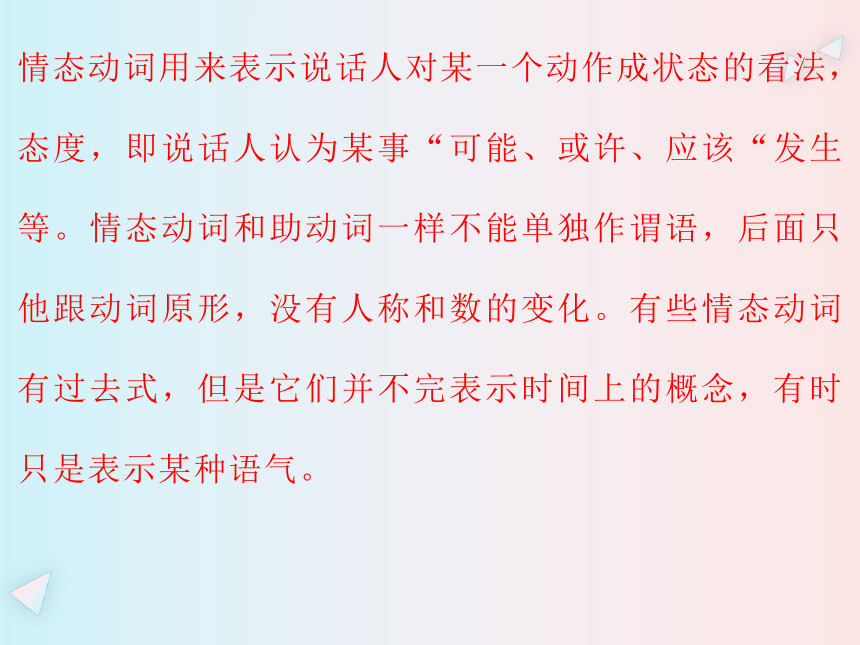
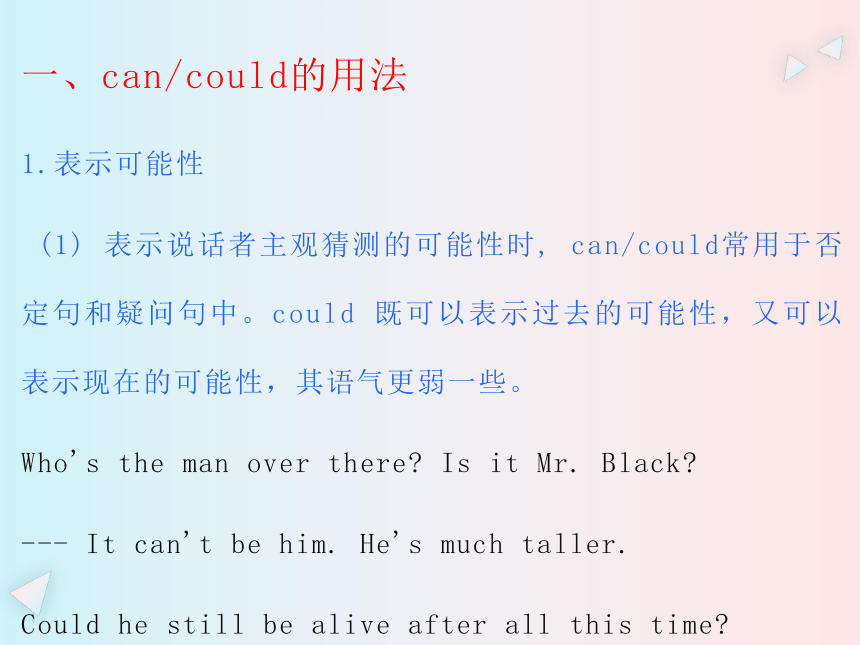
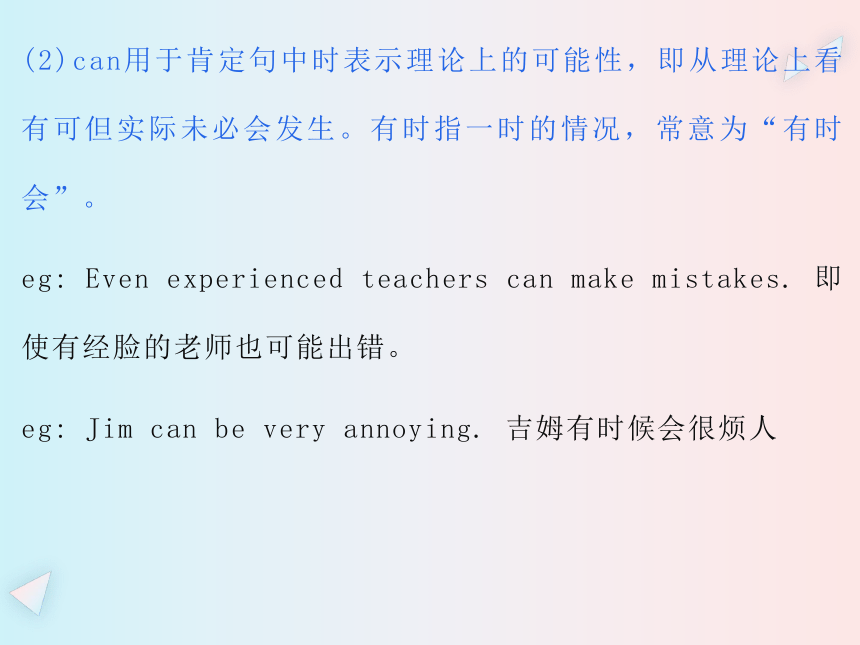
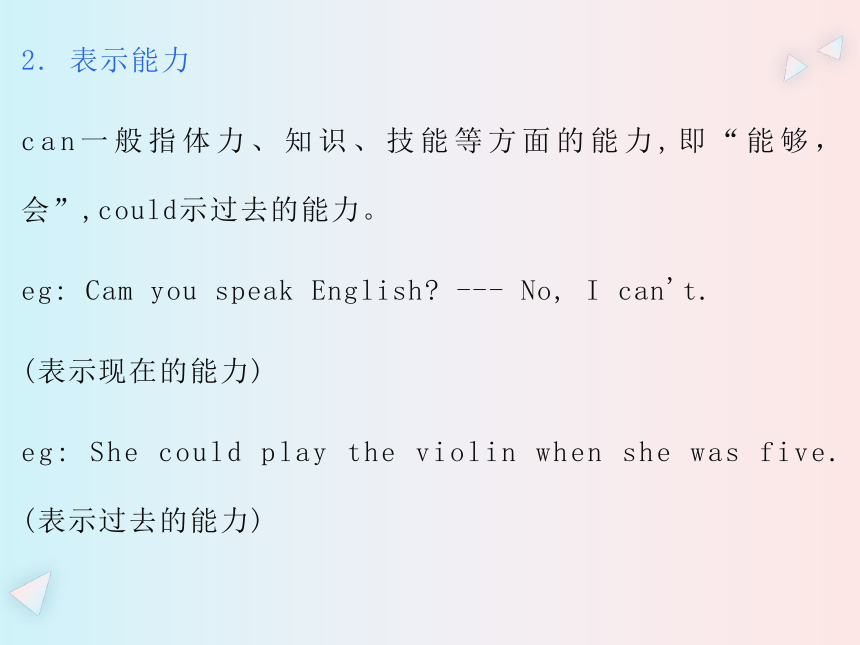
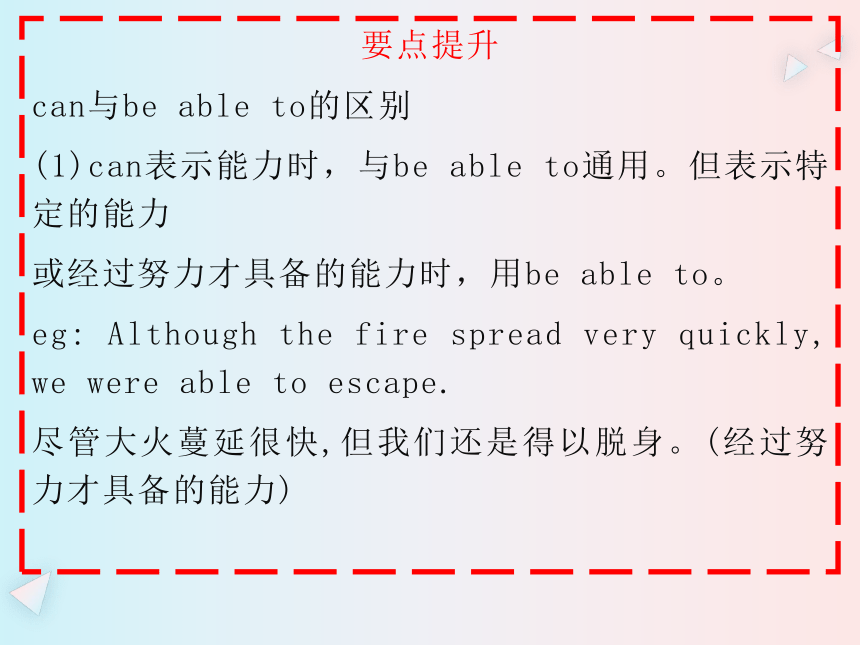
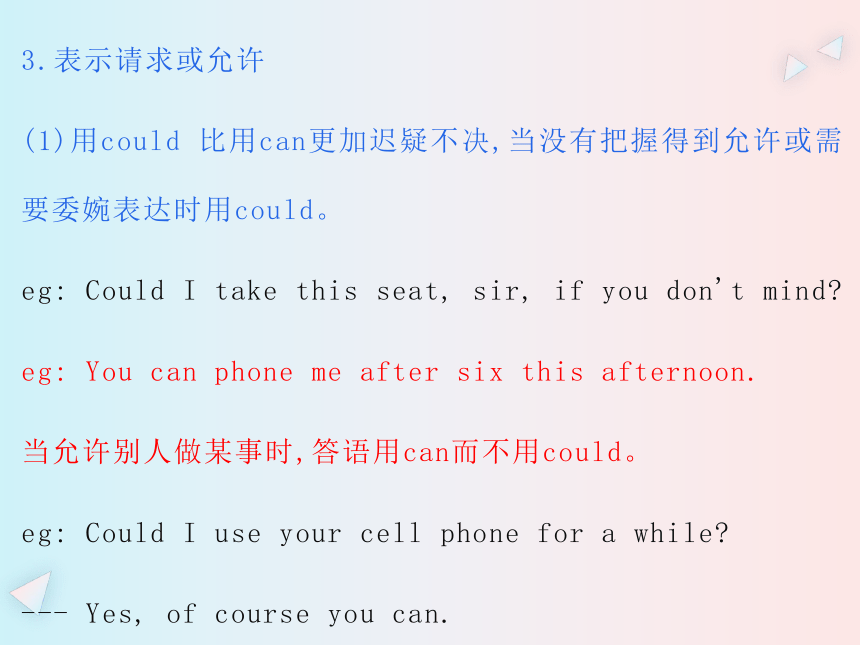
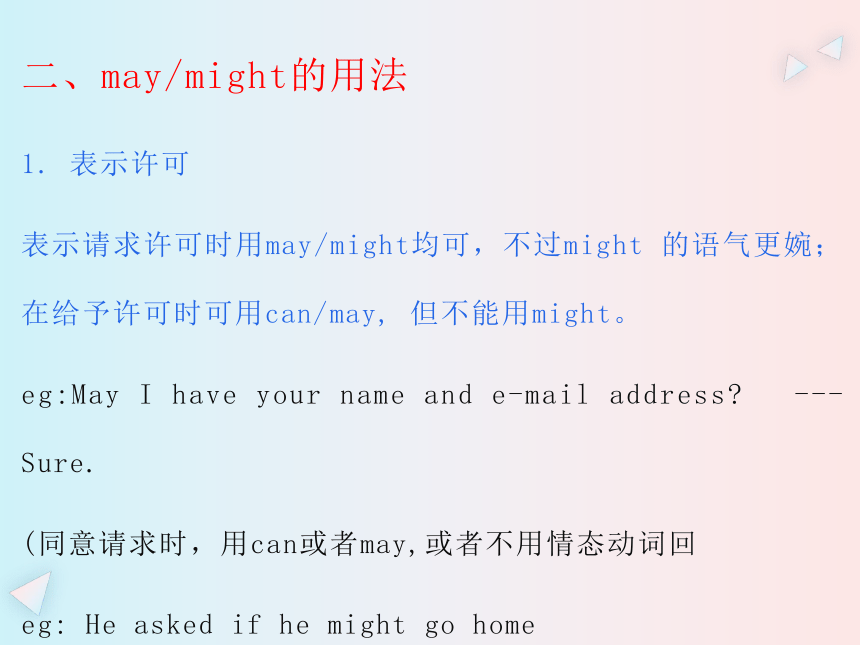

文档简介
(共25张PPT)
初中英语语法大全
情态动词
情态动词用来表示说话人对某一个动作成状态的看法,态度,即说话人认为某事“可能、或许、应该“发生等。情态动词和助动词一样不能单独作谓语,后面只他跟动词原形,没有人称和数的变化。有些情态动词有过去式,但是它们并不完表示时间上的概念,有时只是表示某种语气。
一、can/could的用法
1.表示可能性
(1) 表示说话者主观猜测的可能性时, can/could常用于否定句和疑问句中。could 既可以表示过去的可能性,又可以表示现在的可能性,其语气更弱一些。
Who's the man over there Is it Mr. Black
--- It can't be him. He's much taller.
Could he still be alive after all this time
(2)can用于肯定句中时表示理论上的可能性,即从理论上看有可但实际未必会发生。有时指一时的情况,常意为“有时会”。
eg: Even experienced teachers can make mistakes. 即使有经脸的老师也可能出错。
eg: Jim can be very annoying. 吉姆有时候会很烦人
2. 表示能力
can一般指体力、知识、技能等方面的能力,即“能够,会”,could示过去的能力。
eg: Cam you speak English --- No, I can't.
(表示现在的能力)
eg: She could play the violin when she was five. (表示过去的能力)
要点提升
can与be able to的区别
(1)can表示能力时,与be able to通用。但表示特定的能力
或经过努力才具备的能力时,用be able to。
eg: Although the fire spread very quickly, we were able to escape.
尽管大火蔓延很快,但我们还是得以脱身。(经过努力才具备的能力)
3.表示请求或允许
(1)用could 比用can更加迟疑不决,当没有把握得到允许或需要委婉表达时用could。
eg: Could I take this seat, sir, if you don't mind
eg: You can phone me after six this afternoon.
当允许别人做某事时,答语用can而不用could。
eg: Could I use your cell phone for a while
--- Yes, of course you can.
二、may/might的用法
1. 表示许可
表示请求许可时用may/might均可,不过might 的语气更婉;在给予许可时可用can/may, 但不能用might。
eg:May I have your name and e-mail address --- Sure.
(同意请求时,用can或者may,或者不用情态动词回
eg: He asked if he might go home
2、表示可能性
may/ might表示把握性不大的推测,意为“或许;大概”。可以对现在过去或将来的情况进行推测,常用于肯定句中, might表示的可能性低于may。
eg:It may rain day after tomorrow. (可能性比大一些)
eg: It might rain the day after tomorrow.
eg: Mike might phone. If he does, could you ask him to ring later
要点提升
may的否定式可以是may not,意为“可能不”。但是要表示“不许,禁止”等含义时,常用mustn’t。
eg: May I smoke here 我可以在这里抽烟吗
--- Yes, please./Certainly./Sure.可以,请吧。/当然可以。
--- No, you mustn’t. 不可以。
三. must的用法
1.表示必须
must表示必须多指现在或将来的情况,强调说话者的主观语气即说话者认为有必要或有义务做某事。对其一般疑问句的肯同答用must,否定回答用needn't或者don't have to。
Everyone must take notes carefully in Professor Liu’s class.
Must I finish the work tonight
---Yes, you must.
--- No, you needn’t /don't have to.
2、表示推测
must表示推测时,指有把握的、有根据的推测,只能用于肯定句。可以对现在、过去或将来的情况进行推测。
Excuse me, whose book is this
It must be John's. It has his name on it.
The two boys look very much alike. They must be twins.
四、need的用法
1. 作情态动词
need作情态动词时多用于否定句和疑问句中,无人称和数的变化,后接动词原形。由need引起的一般疑问句,肯定回答常用must或have to,否定回答常用needn't。
Need I answer the question
--- Yes,you must /have to.
--- No, you needn’ t.
2. 作实义动词
need作实义动词时,主要用于肯定句中,有人称和数的变化,后接带to的不定式。其否定式和疑问式都要借助助动词do。
eg: You need to do the rest of the work today.
eg: I need to say my telephone number again
五. will/would的用法
1、表示意愿
表示自愿做或主动提出做建电如意志 愿望或决心等,可用于各种人称。would是will的过去式。
eg: I won’t argue with you.我不愿意和你争辩。
eg: Jane said she would not go with Tom, for she didn’t like him.
简说她不愿和汤姆一起去,因为她不喜欢他。
2. 表示请求
表示征求意见或提出请求,多用于第二人称作主语的疑向句中,would不表示过去式,而表示语气比较委婉。
eg: Will you eat dinner with me tomorrow, Tom 汤姆明天你和我一起吃饭,好吗
eg: Would you please do me a favor 你可以帮我一个忙吗
3、表示习惯或特性
带有主观性,意为“总是”。will表示现在的习惯,would表示过去的习惯。
eg: Tom will keep asking silly questions.
eg: Kelly would take the subway to the office when she worked in Shanghai.
六. shall的用法
1.表示征求对方的意见或请求
shall表示征求对方意见或请求时,主要用于第一、三人称作主语的疑问句中。
eg:Shall I turn on the lights 我把灯打开好吗
eg: When shall he be able leave to the hospital?他什么时候能出院?
eg: Shall my son carry the bag for you 让我儿子帮你提那个袋子,好吗
七、should的用法
1. 表示义务、责任等
should表示义务、责任时意为“应该”,这种用法 往往表示说话者的观点,可用于各种人称。
Drivers should obey the speed limit.
Children should be taught to speak the truth.
2. 表示提供帮助、建议或要求对方给出意见
Should I help you with the housework
How do you think I should deal with all kinds of problems
3. 表示征求意见
作为shall的过去式,用于第一、三人称作主语的问句,多用在间接引语中,以征求对方的意见。
I asked the manager if I should have a few days off.
Mr. Wang asked if he should get his visa the next day.
4. 表示按照一定的根据进行的推测
She left hours ago. She should be home now.她几个小时前就离开了,现在应该在家。
Which province is the warmest one in winte
It should be Hainan Province, I think.
八.used to的用法
used to没有人称和数的变化,表示曾经习惯做某事或曾经存在某种状态。其否定形式为usedn't to或didn't use to,其一般疑问句形式是将used提到主语前。
eg:I used to shudy in a nearby primary school.我过去在附近一所小学上学。
eg:He usedn’t to/didn’t use to drink.他从前不喝酒。
eg:He used to get up early.过去他经常早起。
used to与would的区别
used to表示过去经常性的动作或状态,暗含现在该动作已不再发生或存在;would仅表示过去经常性的动作,不说明现在的情况。
We used to be friends.
When we worked in the same office, we would often have coffee together.
九、had better的用法
1. 表示劝告或建议
eg: You' d better eat these bananas before they go bad.
2. had better的否定形式
其否定形式是将not直接放在had better的后面。
eg: You had better not miss the last bus.
初中英语语法大全
情态动词
情态动词用来表示说话人对某一个动作成状态的看法,态度,即说话人认为某事“可能、或许、应该“发生等。情态动词和助动词一样不能单独作谓语,后面只他跟动词原形,没有人称和数的变化。有些情态动词有过去式,但是它们并不完表示时间上的概念,有时只是表示某种语气。
一、can/could的用法
1.表示可能性
(1) 表示说话者主观猜测的可能性时, can/could常用于否定句和疑问句中。could 既可以表示过去的可能性,又可以表示现在的可能性,其语气更弱一些。
Who's the man over there Is it Mr. Black
--- It can't be him. He's much taller.
Could he still be alive after all this time
(2)can用于肯定句中时表示理论上的可能性,即从理论上看有可但实际未必会发生。有时指一时的情况,常意为“有时会”。
eg: Even experienced teachers can make mistakes. 即使有经脸的老师也可能出错。
eg: Jim can be very annoying. 吉姆有时候会很烦人
2. 表示能力
can一般指体力、知识、技能等方面的能力,即“能够,会”,could示过去的能力。
eg: Cam you speak English --- No, I can't.
(表示现在的能力)
eg: She could play the violin when she was five. (表示过去的能力)
要点提升
can与be able to的区别
(1)can表示能力时,与be able to通用。但表示特定的能力
或经过努力才具备的能力时,用be able to。
eg: Although the fire spread very quickly, we were able to escape.
尽管大火蔓延很快,但我们还是得以脱身。(经过努力才具备的能力)
3.表示请求或允许
(1)用could 比用can更加迟疑不决,当没有把握得到允许或需要委婉表达时用could。
eg: Could I take this seat, sir, if you don't mind
eg: You can phone me after six this afternoon.
当允许别人做某事时,答语用can而不用could。
eg: Could I use your cell phone for a while
--- Yes, of course you can.
二、may/might的用法
1. 表示许可
表示请求许可时用may/might均可,不过might 的语气更婉;在给予许可时可用can/may, 但不能用might。
eg:May I have your name and e-mail address --- Sure.
(同意请求时,用can或者may,或者不用情态动词回
eg: He asked if he might go home
2、表示可能性
may/ might表示把握性不大的推测,意为“或许;大概”。可以对现在过去或将来的情况进行推测,常用于肯定句中, might表示的可能性低于may。
eg:It may rain day after tomorrow. (可能性比大一些)
eg: It might rain the day after tomorrow.
eg: Mike might phone. If he does, could you ask him to ring later
要点提升
may的否定式可以是may not,意为“可能不”。但是要表示“不许,禁止”等含义时,常用mustn’t。
eg: May I smoke here 我可以在这里抽烟吗
--- Yes, please./Certainly./Sure.可以,请吧。/当然可以。
--- No, you mustn’t. 不可以。
三. must的用法
1.表示必须
must表示必须多指现在或将来的情况,强调说话者的主观语气即说话者认为有必要或有义务做某事。对其一般疑问句的肯同答用must,否定回答用needn't或者don't have to。
Everyone must take notes carefully in Professor Liu’s class.
Must I finish the work tonight
---Yes, you must.
--- No, you needn’t /don't have to.
2、表示推测
must表示推测时,指有把握的、有根据的推测,只能用于肯定句。可以对现在、过去或将来的情况进行推测。
Excuse me, whose book is this
It must be John's. It has his name on it.
The two boys look very much alike. They must be twins.
四、need的用法
1. 作情态动词
need作情态动词时多用于否定句和疑问句中,无人称和数的变化,后接动词原形。由need引起的一般疑问句,肯定回答常用must或have to,否定回答常用needn't。
Need I answer the question
--- Yes,you must /have to.
--- No, you needn’ t.
2. 作实义动词
need作实义动词时,主要用于肯定句中,有人称和数的变化,后接带to的不定式。其否定式和疑问式都要借助助动词do。
eg: You need to do the rest of the work today.
eg: I need to say my telephone number again
五. will/would的用法
1、表示意愿
表示自愿做或主动提出做建电如意志 愿望或决心等,可用于各种人称。would是will的过去式。
eg: I won’t argue with you.我不愿意和你争辩。
eg: Jane said she would not go with Tom, for she didn’t like him.
简说她不愿和汤姆一起去,因为她不喜欢他。
2. 表示请求
表示征求意见或提出请求,多用于第二人称作主语的疑向句中,would不表示过去式,而表示语气比较委婉。
eg: Will you eat dinner with me tomorrow, Tom 汤姆明天你和我一起吃饭,好吗
eg: Would you please do me a favor 你可以帮我一个忙吗
3、表示习惯或特性
带有主观性,意为“总是”。will表示现在的习惯,would表示过去的习惯。
eg: Tom will keep asking silly questions.
eg: Kelly would take the subway to the office when she worked in Shanghai.
六. shall的用法
1.表示征求对方的意见或请求
shall表示征求对方意见或请求时,主要用于第一、三人称作主语的疑问句中。
eg:Shall I turn on the lights 我把灯打开好吗
eg: When shall he be able leave to the hospital?他什么时候能出院?
eg: Shall my son carry the bag for you 让我儿子帮你提那个袋子,好吗
七、should的用法
1. 表示义务、责任等
should表示义务、责任时意为“应该”,这种用法 往往表示说话者的观点,可用于各种人称。
Drivers should obey the speed limit.
Children should be taught to speak the truth.
2. 表示提供帮助、建议或要求对方给出意见
Should I help you with the housework
How do you think I should deal with all kinds of problems
3. 表示征求意见
作为shall的过去式,用于第一、三人称作主语的问句,多用在间接引语中,以征求对方的意见。
I asked the manager if I should have a few days off.
Mr. Wang asked if he should get his visa the next day.
4. 表示按照一定的根据进行的推测
She left hours ago. She should be home now.她几个小时前就离开了,现在应该在家。
Which province is the warmest one in winte
It should be Hainan Province, I think.
八.used to的用法
used to没有人称和数的变化,表示曾经习惯做某事或曾经存在某种状态。其否定形式为usedn't to或didn't use to,其一般疑问句形式是将used提到主语前。
eg:I used to shudy in a nearby primary school.我过去在附近一所小学上学。
eg:He usedn’t to/didn’t use to drink.他从前不喝酒。
eg:He used to get up early.过去他经常早起。
used to与would的区别
used to表示过去经常性的动作或状态,暗含现在该动作已不再发生或存在;would仅表示过去经常性的动作,不说明现在的情况。
We used to be friends.
When we worked in the same office, we would often have coffee together.
九、had better的用法
1. 表示劝告或建议
eg: You' d better eat these bananas before they go bad.
2. had better的否定形式
其否定形式是将not直接放在had better的后面。
eg: You had better not miss the last bus.
同课章节目录
- 词法
- 名词
- 动词和动词短语
- 动词语态
- 动词时态
- 助动词和情态动词
- 非谓语动词
- 冠词
- 代词
- 数词和量词
- 形容词副词及其比较等级
- 介词和介词短语
- 连词和感叹词
- 构词法
- 相似、相近词比较
- 句法
- 陈述句
- 一般疑问句和否定疑问句
- 特殊疑问句及选择疑问句
- 反意疑问句
- 存在句(There be句型)
- 宾语从句
- 定语从句
- 状语从句
- 主谓一致问题
- 简单句
- 并列句
- 复合句
- 主谓一致
- 主、表语从句
- 名词性从句
- 直接引语和间接引语
- 虚拟语气
- 感叹句
- 强调句
- 倒装句
- 祈使句
- 句子的成分
- 句子的分类
- 题型专区
- 单项选择部分
- 易错题
- 完形填空
- 阅读理解
- 词汇练习
- 听说训练
- 句型转换
- 补全对话
- 短文改错
- 翻译
- 书面表达
- 任务型阅读
- 语法填空
- 其他资料
